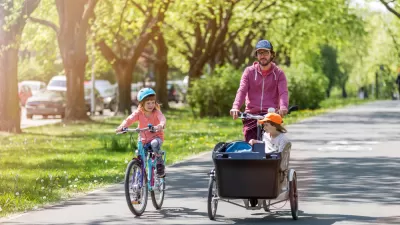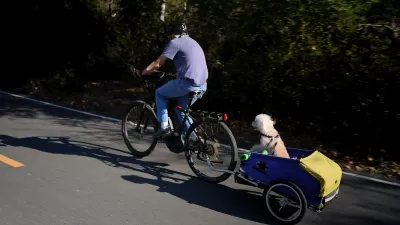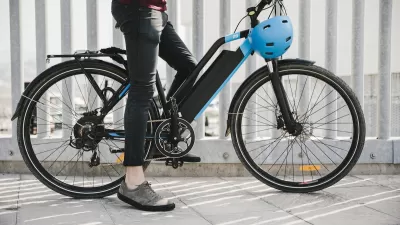A new white paper lays the groundwork for better e-bike incentive programs.

Kea Wilson reports for Streetsblog USA:
In a new white paper from Portland State University, researchers looked at more than 70 current, former, and upcoming efforts to subsidize the use of electric bicycles in the U.S. and Canada, and how those local programs might have an even bigger impact in the future — and eventually, win more funding at the local, state, and federal level.
As explained by Wilson, e-bike incentive programs can take many forms, such as rebates, vouchers, tax credits, and lending libraries. Many of these programs are already in place around the country. Denver’s e-bike rebate program, launched in April, is already proving popular. Los Angeles launched a Universal Basic Mobility program in April that included a lending library.
The benefits of e-bike incentive programs are measured in Vehicle Miles Traveled and Greenhouse Gas Emissions. “Early research has shown that 62 percent of North American e-bike trips replace a journey that would have otherwise been taken in a car, and access to e-bike share alone can reduce a city residents’ automobile mileage by 20 percent,” according to Wilson.
John MacArthur, sustainable transportation manager for the Transportation Research and Education Center at PSU, is quoted in the article describing the need to better make the case for the community benefits of e-bike adoption. To fulfill some of that purpose, MacArthur created an “e-bike incentive program tracker to see how the details of those North American programs stack up, followed by interviews with many of those programs’ administrators,” reports Wilson.
More findings from the white paper and the tracker can be found at the source article below.
FULL STORY: We Need More — And Better — E-Bike Incentive Programs Across America

Planetizen Federal Action Tracker
A weekly monitor of how Trump’s orders and actions are impacting planners and planning in America.

San Francisco's School District Spent $105M To Build Affordable Housing for Teachers — And That's Just the Beginning
SFUSD joins a growing list of school districts using their land holdings to address housing affordability challenges faced by their own employees.

The Tiny, Adorable $7,000 Car Turning Japan Onto EVs
The single seat Mibot charges from a regular plug as quickly as an iPad, and is about half the price of an average EV.

With Protected Lanes, 460% More People Commute by Bike
For those needing more ammo, more data proving what we already knew is here.

In More Metros Than You’d Think, Suburbs are Now More Expensive Than the City
If you're moving to the burbs to save on square footage, data shows you should think again.

The States Losing Rural Delivery Rooms at an Alarming Pace
In some states, as few as 9% of rural hospitals still deliver babies. As a result, rising pre-term births, no adequate pre-term care and "harrowing" close calls are a growing reality.
Urban Design for Planners 1: Software Tools
This six-course series explores essential urban design concepts using open source software and equips planners with the tools they need to participate fully in the urban design process.
Planning for Universal Design
Learn the tools for implementing Universal Design in planning regulations.
Smith Gee Studio
City of Charlotte
City of Camden Redevelopment Agency
City of Astoria
Transportation Research & Education Center (TREC) at Portland State University
US High Speed Rail Association
City of Camden Redevelopment Agency
Municipality of Princeton (NJ)





























